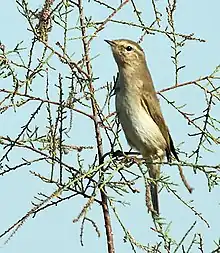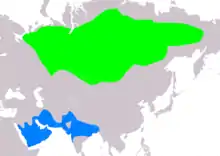Siberian chiffchaff
Siberian chiffchaff (Phylloscopus collybita tristis) is a leaf-warbler which is usually considered a subspecies of the common chiffchaff, but may be a species in its own right.
| Siberian chiffchaff | |
|---|---|
 | |
| Scientific classification | |
| Domain: | Eukaryota |
| Kingdom: | Animalia |
| Phylum: | Chordata |
| Clade: | Dinosauria |
| Class: | Aves |
| Order: | Passeriformes |
| Family: | Phylloscopidae |
| Genus: | Phylloscopus |
| Species: | |
| Subspecies: | P. c. tristis |
| Trinomial name | |
| Phylloscopus collybita tristis Blyth, 1843 | |
 | |
| Range of P. collybita tristis Breeding Non-breeding | |
| Synonyms | |
|
Phylloscopus tristis | |
Range
Siberian chiffchaff breeds in Siberia east of the Pechora River and winters in the lower Himalayas.[1]
Status in Europe and North America
It is also regularly recorded in western Europe in winter, and it is likely that the numbers involved have been underestimated due to uncertainties over identification criteria, lack of good data and recording policies (Sweden and Finland only accept trapped birds).[2]
Because of their unfamiliar appearance, British records in the 1950s and 1960s were originally thought to be greenish warblers, and accepted as such by BBRC, the national rarities committee, until the records were reviewed in the 1980s.[3]
A Gambell, AK bird discovered by Alexander Lin-Moore and Ethan Goodman on June 5, 2015 and seen by many birders would be the 4th (or 5th?) reported in North America.[4]
Appearance and vocalisations
It is a dull bird, grey or brownish above and whitish below, with little yellow in the plumage, and the buff-white supercilium is often longer than in the western subspecies. It has a higher pitched suitsistsuisit song and a short high-pitched cheet call.[5] It is sometimes considered to be a full species due to its distinctive plumage and vocalisations, being similar to P. s. sindianus in these respects.[6][7]
Taxonomy
Common chiffchaffs (of the nominate race) and Siberian chiffchaffs do not recognize each other's songs.[8][9] Pending resolution of the status of the form fulvescens, which is found where the ranges of common chiffchaff (of the race abietinus) and Siberian chiffchaff connect and may[10] or may not[9] be a hybrid between these, tristis is maintained in P. collybita by most checklists.[11]
Resources
- Baker, Kevin (1997). Warblers of Europe, Asia and North Africa (Helm Identification Guides). London: Helm. pp. 256–259. ISBN 978-0-7136-3971-1.
- Dean, Alan; Bradshaw, Colin; Martin, John; Stoddart, Andy; Walbridge, Grahame (2010). "The status in Britain of 'Siberian Chiffchaff'". British Birds. 103: 320–337.
- Dean, Alan (1985). "Review of British status and identification of Greenish Warbler". British Birds. 78 (9): 437–451.
- "Siberian Chiffchaffs in Alaska | Birding Frontiers". birdingfrontiers.com. Archived from the original on 2014-09-09.
- Clement, Peter (1995). The Chiffchaff. London: Hamlyn. ISBN 978-0-600-57978-6.
- (in German) Martens, Jochen (1982): Ringförmige Arealüberschneidung und Artbildung beim Zilpzalp, Phylloscopus collybita. Das lorenzii-Problem. Zeitschrift für Zoologische Systematik und Evolutionsforschung 20: 82–100.
- Helbig, Andreas J.; Martens, Jochen; Seibold, I.; Henning, F.; Schottler, B; Wink, Michael (1996). "Phylogeny and species limits in the Palearctic Chiffchaff Phylloscopus collybita complex: mitochondrial genetic differentiation and bioacoustic evidence" (PDF). Ibis. 138 (4): 650–666. doi:10.1111/j.1474-919X.1996.tb04767.x.
- Schubert, M (1982). "Zur Lautgebung mehrerer zentralasiatischer Laubsänger-Arten (Phylloscopus; Aves, Sylviidae)". Mitteilungen aus dem Zoologischen Museum Berlin (in German). 58: 109–128.
- Martens, Jochen; Meincke, C (1989). "Der sibirische Zilpzalp (Phylloscopus collybita tristis): Gesang und Reaktion einer mitteleuropäischen Population im Freilandversuch". Journal für Ornithologie (in German). 130 (4): 455–473. doi:10.1007/BF01918465. S2CID 25216705.
- (in Russian) Marova, I. M. & Leonovich, V. V. (1993) [Hybridization between Siberian (Phylloscopus collybita tristis) and East European (Ph. collybita abietinus) Chiffchaffs in the area of sympatry.] Sbornik Trudov Zoologicheskogo Muzeya, Moskovskogo Gosudarstvennogo Universiteta 30: 147–163.
- Sangster, George; Knox, Alan G.; Helbig, Andreas J.; Parkin, David T. (2002). "Taxonomic recommendations for European birds". Ibis. 144 (1): 153–159. doi:10.1046/j.0019-1019.2001.00026.x.
Further reading
- Heard, Chris (1989). "Racial identification of wintering Chiffchaffs". Birding World. 2 (2): 60–65.
- King, Jon (1996). "A cat among the chiffchaffs". Birding World. 9 (4): 155–156.
- McGregor, Ross (1997). "Siberian Chiffchaffs in Aberdeenshire". Birding World. 10 (2): 70.
- Pennington, Mike (1997). "Siberian Chiffchaffs in Britain". Birding World. 10 (4): 153–154.
- Millington, Richard (2000). "The Siberian Chiffchaffs in Worcestershire". Birding World. 13 (2): 58–59.
- Dean, Alan R.; Svensson, Lars (2005). "'Siberian Chiffchaff' revisited". British Birds. 98 (8): 396–410.
- Dean, Alan R (2008). "Colour nomenclature and Siberian Chiffchaff". British Birds. 101 (3): 144–149.
- Dubois, Philippe J.; Duquet, Marc (2008). "Further thoughts on Siberian Chiffchaff". British Birds. 101 (3): 149–150.
- den Berg, Arnoud B. (2009). "Calls, identification and taxonomy of Siberian Chiffchaff: an analysis". Dutch Birding. 31 (2): 79–85.
- Ebels, Enno (2009) "Siberische Tjiftjaffen in Nederland: voorkomen en determinatie" Dutch Birding 31(2): 86-100 (in Dutch with English summary)
- McGeehan, Anthony (2011). "Siberian Chiffchaff - in from the cold". Birding World. 24 (1): 18–23.
- de Knijff, Peter; van der Spek, Vincent; Fischer, Johannes (2012). "Genetic identity of grey chiffchaffs trapped in the Netherlands in autumns of 2009-11". Dutch Birding. 34 (6): 386–392.
- Collinson; Martin, J.; Shannon, Thomas; Archer, Paul; Odin, Nigel; Riddington, Roger; Walsh, Paul (2013). "Genetic analysis of migrant Siberian Chiffchaffs in Britain and Ireland". British Birds. 106 (2): 109–113.